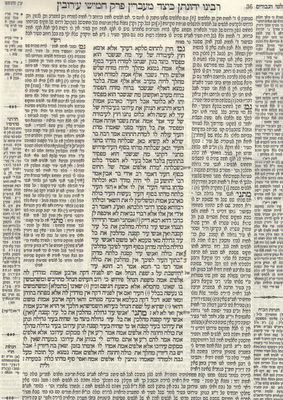
HIDE/SHOW IMAGE
18b
{Eruvin 60b continues}
{The Mishna had said: if he placed his eruv outside of his techum, what he gains he loses}
Outside of the techum, do you think?! {If so, the eruv would be invalid!}
Rather, outside of the extension of the city.
"That which he gains, he loses":
How so?
Such that if he places it to the east of the city at the end of 1000 cubits {and he starts out in the city}, he may walk to the east 3000 cubits {=1000 up to his eruv, and he has 2000 cubits east from his eruv} and thus gains to the east 1000 cubits. And to the west he may only walk 1000 cubits {from the town, since the 2000 cubits starts from the eruv, not the town}. Thus the 1000 cubits that he gained to the east he lost to the west.
And we ask that this implies that what he gains, he loses, and {loses} no more. That is to say, {all} the city is counted as four cubits {just as if his Shabbat center was in the city rather than outside of it}. But we learnt {in a brayta}: One who places his eruv in the extension of the city did not accomplish anything {but rather he is exactly the same as if he had set his Shabbat rest in the city}. If he places it {=the eruv} outside of the extension of the city even a single cubit, he gains that cubit {in that direction} and loses the entire city, for they say that the length of the city {now} counts for his in the measure of the techum {of 2000 cubits, rather than just being like his 4 cubits, from which 2000 cubits are measured from each city limit}.
Rabba bar Shela said: This is no difficulty. Here is where his measure terminates in the middle of the city and here is where his measure terminates at the end of the city.
To explain: Our Mishna, which taught that that which he gains he loses applies only to the techum but in the city, he lost nothing, is where the 2000 cubits of the techum terminates at the end of the city. For Rav Iddi bar Avin cited Rabbi Yehoshua ben Levi: If he was going about his measuring and his measure ended in the middle of the city, he only has half the city. If his measure ended at the end of the city, the entire city is reckoned like {his} four cubits and we complete the remainder {on the opposite side of the city}.
And all the {post-Talmudic} Sages ruled that this is the halacha. And even though Rav Iddi said: These are nought but prophetic utterances {=sheer imagination}, this does not concern us, for Rava derived both from the language of the Mishna and stated that we have learnt both: "The people of a large town may walk through the whole of a small town but the people of a small town may not walk through the whole of a large town." What is the reason? Is it not because for the people of the large town, their measure {of techum} ends at the end of the {small} town, and thus they may walk through all of it, while the people of the small town, their measure {of techum} ends within {=in the middle of} the {large} town, and therefore they may not walk through all of it.
{Eruvin 61a}
Rami bar Chama cited Rav Huna {our gemara has Rav Yosef citing Rami bar Abba citing Rav Huna}: A city which sits on the edge of a ravine, if there is a {דקה} barrier 4 cubits, we measure 2000 cubits from the edge of the ravine.
To explain: Since at most times the ravine is dry and the utilize it, for it is only full {of water} during the rainy season. And since it is not full and they utilize it, it is considered part of the city. And if there is no barrier before it, they only measure from the entrance to their houses.
And why {asks Abaye} is it different here from every other barrier, which need only be 4 handbreadths? Because {answers Rav Yosef} it sits on the edge of a ravine, the use of the place involves fear {due to the steepness of the ravine}. Therefore if it {the barrier} is 4 cubits, yes, and if not, no.
{Eruvin 61b}
Mishna:
The people of a large town may walk about throughout a small town, and the people of a small town may not {in the Mishna in our gemara, they may} walk about throughout a large town.
How so?
If a person was in a large town and put his eruv in a small town, or in a small town and put his eruv in a large town, he may walk throughout it and outside it 2000 cubits.
And Rabbi Akiva says. He has 2,000 cubits from the place of his eruv only. {but not the entirety of the town}
Rabbi Akiva said to them: Do you not agree with me that a person who places his eruv in the cave has only 2000 cubits from the place of his eruv?
They said to him: When? When there are no inhabitants in it. But if there are inhabitants in it, he may walk throughout it and beyond it 2000 cubits.
Thus its interior is less stringent than its exterior.
And to the person who measures, about whom they spoke, they give him 2000 cubits {but no more} even if his measure ends in the cave. {i.e. the entirety of the cave is not allowed, as if it were four cubits}
It's been a while...
-
I've been blogging a bit on Substack, at Scribal Error. While focused more
on gemara and girsaot, I just had a post on Rationalism and Midrash. Check
ou...
3 years ago



No comments:
Post a Comment